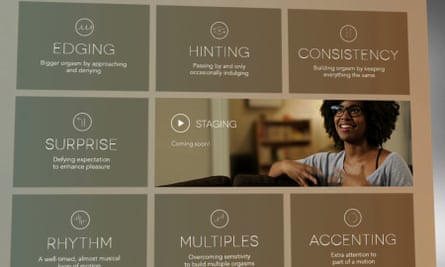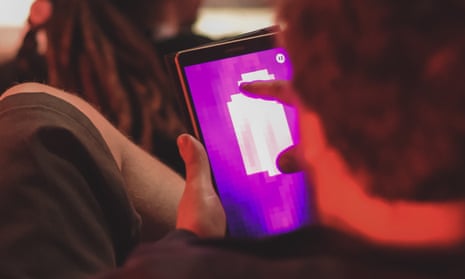I’m watching a musician, with whom I’ve been intimate, play an intimate musical game on his smartphone. As he lightly circles his finger and the music swells, the screen reddens and so do I. This is perhaps the first time I’ve been turned on by a video game – and I’m not even playing it.
This is La Petite Mort, a touch-based game described as a “one of a kind digital erotic experience” by its creator, a small Danish studio named Lovable Hat Cult. The concept arose after a discussion at the Copenhagen Game Collective. This is a network of experimental developers responsible for the annual romance and sex-themed Lyst Summit and other boundary-pushing projects such as an adult colouring game. The hope is that La Petite Mort will be the first in a budding genre: female stimulation simulation. I am totally onboard.
The game’s designer Patrick Jarnfelt says: “We have had a focus on expanding games as an artistic medium in general. We felt like erotic games was a very unexplored area.” So when a fellow Copenhagen-based designer, Lau Korsgaard, told them about an algorithm called cellular automata that could simulate different parts of an organism responding to stimuli, their minds went straight for the vulva.
“We thought, ‘What kind of thing can you do with that?’” says Jarnfelt, “And like, ‘What if it was touch-based?’, and then somehow this eroticism came out of that, so if you interact with this cell-based system it could become erotic because each cell is intelligent and responding to your touch.”
La Petite Mort is made up of a series of audio-visual landscapes and each is an image of a real vulva, pixelated to abstraction. Through the algorithm, the different pixels of each vulva have different preferences, but the sensation will emanate outwards. “So if one cell feels good, it kind of spreads the pleasure to the cells around it,” says the game’s producer Andrea Hasselager.
As a player, if you touch an area in the right way, you can see that pleasure spread on screen as the cells light up, blossoming from the stimulated point. You can draw lines of pleasure or expanding circles, until the whole screen fills in a pulsing climax.
Since the devices on which La Petite Mort is played can’t detect how hard you’re pressing on the screen, making those cells feel good is about location and movement speed, which is why you end up dragging your finger slowly around the screen. Part of the eroticism is surely due to the strangeness of touching your phone or tablet like this, which is what Jarnfelt wanted, though Hasselager says it had a funny effect when it came to playtesting: “You have people play it and people get, like, quite embarrassed when you stand and look over their shoulder, because it gets quite sensual and erotic, you know?”
It took several rounds of playtesting to get to that stage, however. The developers eventually came to a realisation that generations of women have reached before them: despite seemingly obvious audio and visual signals, some players just didn’t get what they were supposed to do. Eventually these “usability issues” led Jarnfelt to add text prompts. Sometimes a non-pleasurable touch will cause the vulva to move away or you’ll hear a firm negative response. If you’re like me, you’ll trigger a text message that says something like “Slow down” or “I’m sensitive”. As is probably the case in many real-world situations involving female stimulation, you only get this verbal feedback if you’re doing something wrong.
“It had to be a little bit obvious,” Jarnfelt explains, “So that people don’t just put it away because they don’t understand how to use it.” I ask if they think these “usability issues” reflect the state of female pleasure in the real world. “Oh, totally,” Hasselager says. “Unfortunately, yes.”
Each vulva in the game has different preferences for where and how it likes to be touched, so success is about experimentation and observation. Again this is reflective of real life and is probably something some young men in particular could stand to learn. But Jarnfelt wasn’t intending for the game to be educational. “It’s more about listening and sort of moving slowly and feeling,” says Hasselager. “It is sort of educational on an abstract level, but it’s not, like, one-on-one ‘This is how you do it’.”
This hasn’t stopped some critics from taking issue with the game’s perceived lack of educational value. Hasselager recalls one comment saying people can’t learn from the game because there’s no liquid: “It’s not like you look at a painting and you’re like, ‘Oh, I can’t touch the sea, therefore I can’t feel that it’s beautiful.’”
Even intentionally educational experiences such as the instructional website OMGYes can’t simulate female pleasure to that degree, but La Petite Mort is further down the scale of reality. While both use real and varied vulvas, and include several techniques, everything about La Petite Mort is abstracted. Its vulvas are so low-res that you might not even realise what you were looking at, its adaptive music deliberately non-explicit, its very name a euphemism.

This doesn’t prevent La Petite Mort from telling us interesting things about sensation and performance. When my musician friend manages to work the game into an audio-visual crescendo after only a couple of missteps, it confirms my suspicion that he would perform better than I did – which is one of the reasons I got him to play it. The other reason is more practical: he has an Android phone while I have an iPhone, and Apple has declared this game inappropriate for the App Store.
Jarnfelt discovered this when he tried to update the iOS version of the game and Apple removed it for being “excessively objectionable or crude”. The company’s issue was with the “experiences”, the collectible achievements that players can earn during the game (they didn’t want to use the term “achievements” because it sounded too competitive). In Apple’s email, it attached a screenshot that lists one called “Introit: You did it!” and another “Agitato: That’s the spot! Well done!”. There are more – Andante, Tacet, Crescendo, etc – and although these words are often used to represent and describe sexual experiences in literature (which perhaps explains Apple’s objection), they’re obviously taken from music composition. If agitato is crude then Apple needs to reconsider the catalogue on the iTunes Store.
“I was talking to the guy from Apple on the phone, actually, which is cool, they take the time out to talk to you,” says Jarnfelt. “He told me, ‘Yeah, you and me are French. We understand these things.’ But they have to reach a broad market, and America, and they have to be family-friendly, so they have just not accepted anything like this. And they put their own kind of threshold on what is crude and not crude, and you cannot even discuss it.”
Unfortunately, Apple’s refusal to discuss this female stimulation simulation is representative of a wider issue. Jarnfelt says women have told him that they didn’t talk about things such as masturbation and female pleasure until they were well into their 20s. One of the motivations behind La Petite Mort was to help to normalise that kind of discussion.
Thomas Merton once wrote that art enables us to find ourselves and lose ourselves at the same time. But when so many women are already struggling to find themselves sexually, it’s disheartening that a company that restricts their access to art has decided that female sexual pleasure – even when represented in such an abstract way – is something crude and unsuitable.
